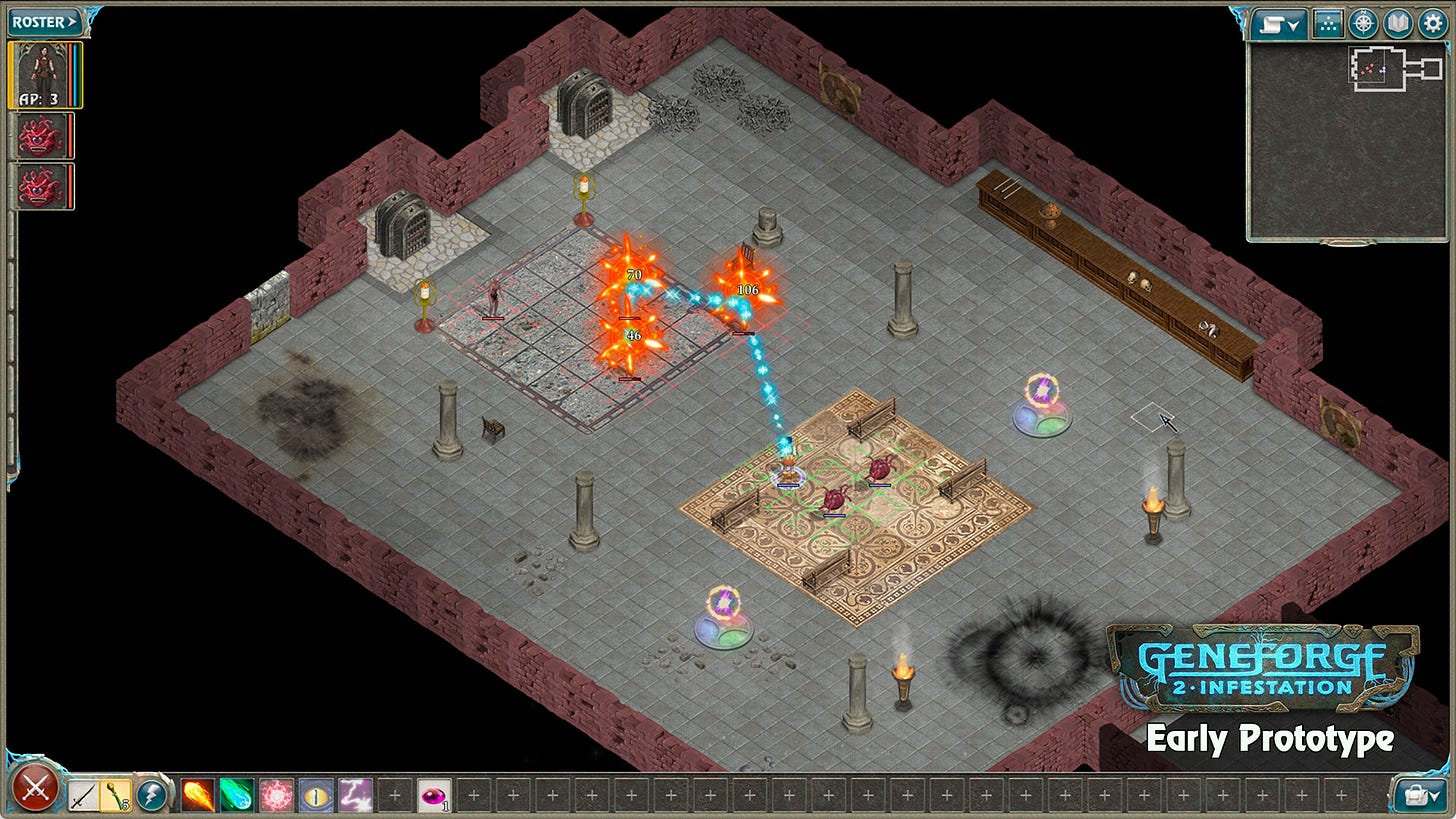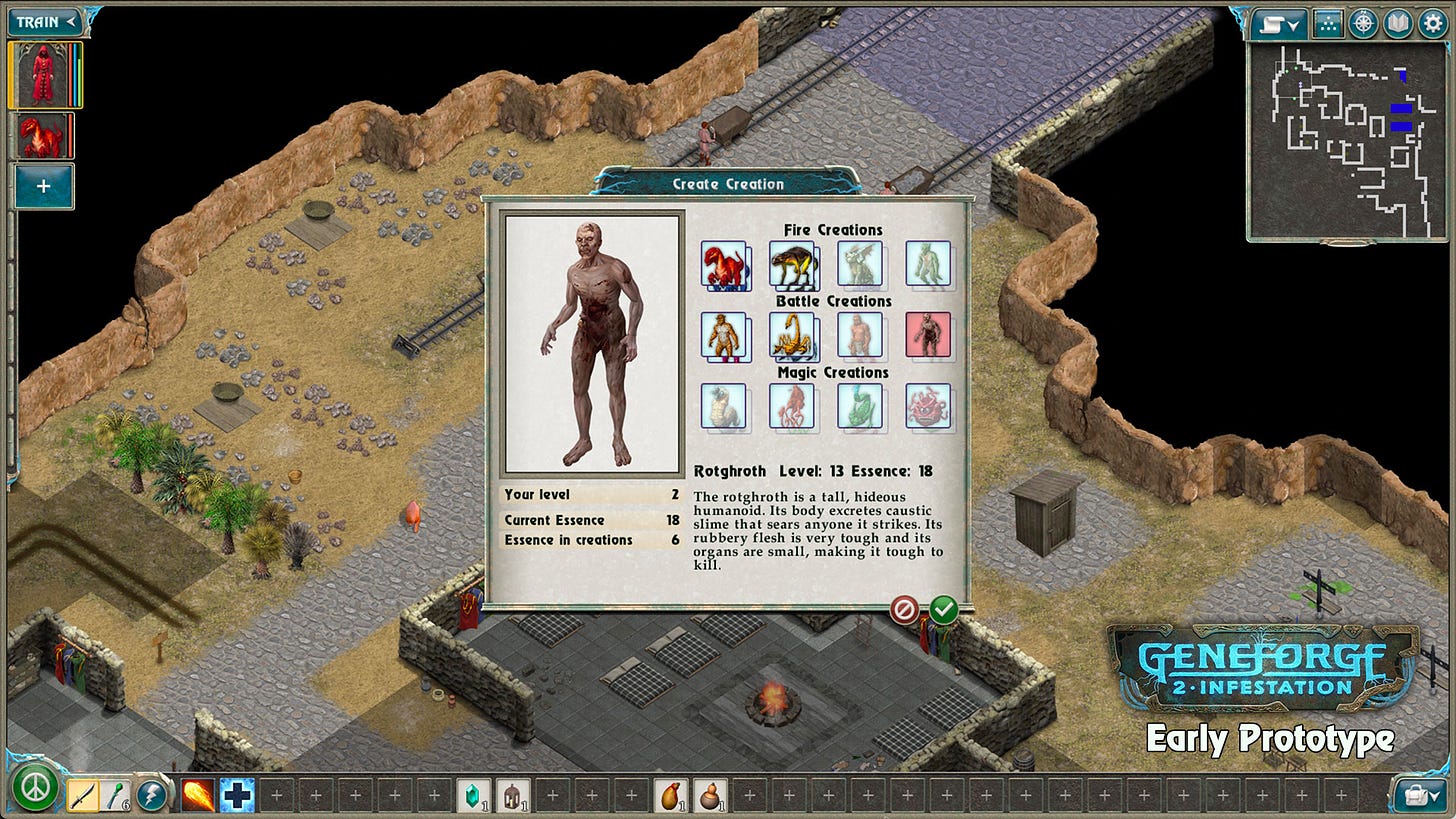We Have a New Kickstarter, Plus Let's Talk About Remasters
When I'm not asking for your money, I have interesting things to say about the business.
I keep saying this blog is free. Of course, it's not. Nothing is. The price of this blog is that, every so often, I put an advertisement in your inbox.
We have just started a Kickstarter for our next game, Geneforge 2 - Infestation. It will be running for the next month. If you can back us, we would be enormously grateful.
I have a whole bunch of quality blog posts stored up, and I'll be posting them over the next month.
First, however, I want to talk about remasters.
If It Was Fun Once, It's Still Fun
Our Geneforge Saga is one of our most popular and enduring creations. We started this five game series in 1999, and Geneforge 1 came out in 2001. (Dwarf Fortress is the banner Olde Game these days, but the first Geneforge game was out and selling before it was even started.)
The Geneforge Saga is a fantasy-science fiction hybrid with a wildly open-ended world, story, and game system. It was crazy innovative back then, and it's still unique today. It has a loyal, cult classic following, but it is also ancient. It doesn't really run anymore. Thus, the remasters.
The first remaster, Geneforge 1 - Mutagen, came out in 2021. It got a great reception and still sells really well. Happily, after doing them for many years, we've got the hang of doing remasters.
The Magic of Rewarmed Leftovers
Now that humanity has been making video games for about fifty years, we have a huge backlog of great but forgotten games.
A book printed in 1980 is still perfectly readable. A computer program written in 1980 requires emulation. And then, when it runs, you're still running a program written in 1980, which is going to feel pretty archaic. Interface design back then was not so good.
Archivists work hard to preserve old video games, which is awesome, but I want my games to not just function. I want them to be fun. Geneforge 2, which came out in 2003, still kind of runs on Windows 10 (which is surprising and awesome), and we still sell the old Geneforge games on Steam and GOG.com.
But I don't want my best work to be "barely functional". When I retire, I want as much of it as possible to shine. Pride in craftsmanship, and all that. Other developers feel the same way.
There are lots of remasters of classics out there. Recent examples: Demon's Souls. Final Fantasy VII. The Last of Us. (Repeatedly.) Classic World of Warcraft. There's a deep well of beloved products to draw from.
But how to do the remaster? That is a tough question.

How Much Do You Change?
If there is anything I've learned from all the remasters I've done, it's this: Respect what made people love the original.
When I did earlier remasters, I often redid things like the game system, because I thought my wiser game designer brain could make the old stuff better. Nope. Never forget that nothing ruins a good game faster than more game design.
My old worlds and game systems were done when both I and my art form were a lot younger. They were crude, weird, and unbalanced. People also loved them. When I changed them into something more in line with current design standards, players were vocally unhappy.
With Geneforge, I kept the old game system intact as much as possible. When I changed it, it was to add options. More spells, more stats, more strategies, more content. Players generally like getting more stuff.
Combined with updating the interface and graphics (something that never gets complaints), and you have a solid remaster that keeps a game playable for another few decades.

Big Developers Having Varying Success
The most successful AAA remasters are the ones that keep the original game as much as possible and add to it. The new Demon's Souls plays really close to the original, but it has terrific graphics now. Same with the multiple new versions of Last of Us.
The Final Fantasy VII remake, on the other hand, seems largely forgotten. The original was beloved and a blast to play, but it was also retro. The new version is really arcadey, and watching it left me with no desire to play it.
The story of Final Fantasy VII is a lot of why it is so fondly remembered. So that should have been left alone. Instead, they really changed that too. Also, the whole story is being released over like seven years. So at a certain point, I have to ask, "Why did you do that?"
It's also a shame because the old Final Fantasy games are still surprisingly playable and work great on mobile. This is not true of all old games.
Some Games Are Unremasterable
This is an aside, but I think it's an interesting one.
Some games are worth keeping for archival and historical purposes, but nobody should actually play them. You can't remaster them because there's nothing there to remaster. You would have to build a whole new structure on top of the original, and this will always be disappointing.
My best examples of this are Ultima III: Exodus and Ultima IV: Quest of the Avatar. These games are unquestionable classics. They were huge hits that had enormous effects on how games were designed. Without them, I probably would never have written games. I speedran Ultima IV before anyone knew what speedrunning was.
There is no reason to play them today. They're just too crude and simple. If you are learning to design games, there are better examples to play.
The most interesting cases are the games that are still fun after all these years. The original Final Fantasy games are. So is Robotron: 2084. So is Pong.
The Importance of Humility
I can understand why the creators of Final Fantasy VII changed so much. Creators want to create. Young, ambitious designers don't want to be like medieval monks, reverently copying the ancient scrolls. They want to make new things. I understand completely.
The problem is that, when you're remastering a classic, you probably aren't as good as the people who created the original.
Fortunately, I don't have that problem. I have no difficulties letting the work made by younger-me speak for itself. I can easily get out of my own way. Speaking of which, I'm getting old.

Preparing For Posterity
I have written eighteen full-length, all-new games in my career.
That is a LOT.
A novelist who has written 18 books has had a very full career. I am at the point where retirement is in sight. I want to leave my work in as modern and playable a state as possible. The Geneforge games being so hard to enjoy in their current state is painful to me.
I currently have 7 games, counting Geneforge 2, that I want to remaster. I put a huge amount of work into these projects, going over everything carefully. It takes about 18 months for a full remaster. Which means this is a project that will carry me to retirement age.
However, it's a tough business, we're still a tiny company, and children gotta' eat. We can only make these games with the support of our supportive, awesome fans, all of whom have terrific taste.
Hence this crass self-promotion. If you've enjoyed my work (games or writing), we hope you'll consider backing the Geneforge 2 - Infestation Kickstarter. In return, you will get a game that, I believe, will be really quite fun.
Thank you! Without you, we're nothing.
Subscribe to this blog for free to get all of our thoughts sent directly to you. Thank you for your support!




You've often been talking about retirement. I just had to buy my first pair of bifocals yesterday, and retirement from the software industry is on my mind too. In every RPG game there's a steady increase of stats - your character buffs up, gets physically stronger and more powerful and has more money. I wonder what it would be like on the other side? ...
Maybe your character's DEX, STR, CON would decrease, and you compensate for them with your increasing WIS+CHA+coins. Like say a wealthy industrialist whose power grows with wealth as they age.
Or maybe also WIS, INT decrease as well like someone whose brain no longer works as sharply as it once did and you forget things more. Maybe your coins don't increase as you eat through your retirement savings.
It might make a really unpleasant and irritating game! And we all play RPGs because we're addicted to stat increases! On the other hand, as I play through The Witcher 3, I really don't like having progressed so many levels -- now at level 50 near the end of the game, kind of preferred challenges and balance of the earlier levels of the game.
I get that time marches on, but I still feel like Ultima IV is far from a 'crude and simple' game. And Ultima V in my opinion is still a better ride (and smarter design) than many a modern CRPG. Maybe my rose colored glasses are bolted on too tight, but I don't think it's just that. Nobody (except the CRPG addict) WILL play those games, I imagine, but I don't think nobody SHOULD. (I also think they still have useful design lessons.)